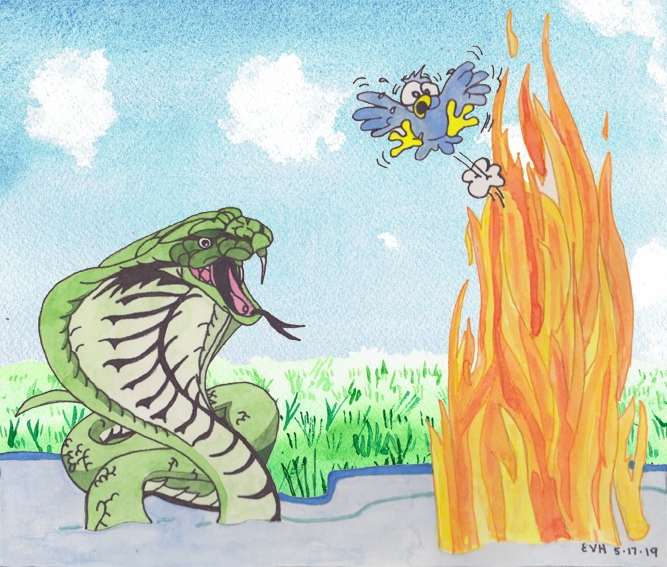
Jataka 133
Gathāsana Jātaka
The Water Fire
as told by Eric Van Horn
originally translated by Robert Chalmers, B.A., of Oriel College, Oxford University
originally edited by Professor Edward Byles Cowell, Cambridge University
This is a story about being practical. Larry Rosenberg once said that he was amazed at how many otherwise intelligent, accomplished people leave their common sense at the door when it comes to their spiritual practice.
I think this is often fed by a culture of “Buddhist machismo.” You get encouraged to sit through pain, sit through fatigue, to sit through soreness and discomfort. Some of that may be helpful, at least in small doses. But I think that too many meditation teachers encourage you to push yourselves beyond reasonable limits.
I recently heard a German monk echo my personal experience, and that is that I have never gamely sat through pain and found it to be of any benefit. And I cannot recall the Buddha ever saying that, either. And in this story, he admonishes a monk who does not have enough sense to – literally – come in out of the rain.
And finally, it is also worth noting that the Naga King certainly seems to have had a legitimate complaint!
“Lo! In your stronghold.” This story was told by the Master while he was at Jetavana. It is about a monk who was given a subject for meditation by the Master. He went to the border region and established himself in a hut near a small village. Here he hoped to pass the rainy season.
However, during the very first month his hut burned down while he was seeking alms in the village. With the loss of his shelter, he told his lay friends of his misfortune. They readily agreed to build him another hut. But, in spite of their promises, three months went by without its being built.
Because he did not have a roof to protect him, the monk did not have any success in his meditation. At the end of the rainy season he went back to Jetavana and stood respectfully before the Master. The Master asked him whether his meditation had been successful. The monk told him what had happened. The Master said, “In days gone by, even animals could tell the difference between what was good for them and what was bad. They knew when to leave places that had become dangerous to them. And if beasts were so discerning, how could you fall so far short of them in wisdom?” So saying, at the monk’s request the Master told this story of the past.
Once upon a time when Brahmadatta was reigning in Benares, the Bodhisatta was born as a bird. When he came of age, good fortune attended him and he became the king of the birds.
He lived with his subjects in a giant tree that stretched its leafy branches over the waters of a lake. And all these birds, roosting in the boughs, dropped their dung into the waters below.
Now that lake was the home of Caṇḍa, the Naga (serpent) King. He was enraged by this fouling of his water, and he was determined to get vengeance on the birds and to burn them out. So one night when they were all roosting along the branches, he set to work. First, he made the waters of the lake boil. Then he caused smoke to arise, and finally he made flames shoot up as high as a palm tree.

Figure: Stop Pooping in My Lake!
Seeing the flames shooting up from the water, the Bodhisatta cried to the birds, “Water is used to put out fire. But here the water itself is on fire. This is no place for us. Let us find a home elsewhere.” So saying, he uttered this stanza:
Lo! In your stronghold stands the foe,
And even the water does burn.
So from your tree quickly go,
Let trust to fear turn.
And hereupon the Bodhisatta flew off with the birds that followed his advice. But the disobedient birds, who stayed behind, all perished.
His lesson ended, the Master taught the Four Noble Truths, at the end of which that monk became an arahant. The Master identified the birth by saying, “The loyal and obedient birds of those days have now become my disciples, and I myself was the king of the birds.”
